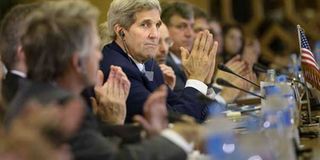US Secretary of State John Kerry assures allies over Iran deal

Secretary of State John Kerry (C) listens during the opening of a US-Egypt strategic dialogue at the Ministry of Foreign Affairs August 2, 2015 in Cairo. Kerry will meet Egyptian President Abdel Fattah al-Sisi in Cairo to re-launch strategic talks on a regional mini-tour to sell the Iran nuclear deal to sceptical allies. AFP PHOTO | POOL/BRENDAN SMIALOWSKI
What you need to know:
- In Doha, Mr Kerry will meet his counterparts from the six Gulf Cooperation Council (GCC) member states.
- He will seek to allay their fears about Shiite Iran, following the nuclear deal signed in Vienna.
- Israeli Prime Minister Benjamin Netanyahu will next week redouble efforts to scupper the international nuclear deal with Iran.
CAIRO
US Secretary of State John Kerry has said there was “no question” the Iran nuclear deal will make the Middle East safer if implemented, as he sought to win over sceptical allies.
Mr Kerry met Egyptian Foreign Minister Sameh Shoukry in the morning and was to later meet President Abdel Fattah al-Sisi before flying to Qatar to meet Gulf Arab counterparts.
Egypt, and other countries in the region such as Saudi Arabia, are suspicious of Iran, which they view as bent on destabilising their countries.
“There can be absolutely no question that if the Vienna plan is fully implemented, it will make Egypt and all the countries of this region safer than they otherwise would be or were,” Kerry told a Cairo press conference after meeting Shoukry.
“The United States and Egypt recognise that Iran is engaged in destabilising activities in the region — and that is why it is so important to ensure that Iran’s nuclear programme remains wholly peaceful,” he said.
“If Iran is destabilising, it is far, far better to have an Iran that doesnt have a nuclear weapon than one that does.”
Mr Kerry’s trip, which ends on August 8, will not include Israel, one of Washington’s closest allies, which has been a fierce critic of the July 14 nuclear deal between the world powers and Iran.
In Doha, Mr Kerry will meet his counterparts from the six Gulf Cooperation Council (GCC) member states.
He will seek to allay their fears about Shiite Iran, following the nuclear deal signed in Vienna.
Meanwhile, Israeli Prime Minister Benjamin Netanyahu will next week redouble efforts to scupper the international nuclear deal with Iran, making a personal appeal to Jewish groups across the United States.
Mr Netanyahu, a strident opponent of the agreement, will make a web address on Tuesday that will be available on computers, on mobile phones and in synagogues across America, according to organizers representing more than 100 Jewish groups.
The Israeli premier is also expected to take questions, in an address hosted by the Conference of Presidents of Major American Jewish Organizations and the Jewish Federations of North America.
“The issues involved with the Iran nuclear agreement are complex and of great consequence to the North American Jewish population,” said Stephen Greenberg, chairman of the Presidents’ Conference.
“We welcome this unique opportunity to present the prime minister, who has helped bring these vital issues to public attention.”
Netanyahu’s intervention comes amid a fierce battle with President Barack Obama over the agreement.
Netanyahu says the deal, which would curb Iran’s nuclear program in return for international sanctions relief, is a “stunning, historic mistake.”
He has infuriated the White House by actively opposing what Obama sees as a way to avoid a military conflagration with Iran and a signature foreign policy achievement of his presidency.
Obama has deployed chief lieutenants to make the diplomatic, military and technical case for the deal, ahead of a crunch vote in Congress.
The White House hopes to garner enough votes to prevent the Republican controlled legislative branch from voting against the agreement.
A “no” vote would not automatically kill the deal, but it would force Obama to issue a veto and rally enough Democratic votes to uphold it.
That has prompted a ferocious battle for public opinion, including within the Jewish community.
Key Democrats such New York Senator Charles Schumer have yet to voice their opinion on the deal in public.
Schumer’s public agnosticism reflects the deep divisions the deal has caused with America’s politically attuned Jewish community.
Groups like right-leaning AIPAC and left-leaning J-Street have engaged in a multi-million-dollar public relations faceoff.
Meanwhile federations, individual organizations, Rabbis and Rabbinical assemblies are being pressed to take a stance.
Obama has tasked Secretary of State John Kerry with talking to the same groups organizing Netanyahu’s address, which incidentally comes on the president’s 54th birthday.
Secretary of Defence Ash Carter has travelled to Israel to speak to Netanyahu in person.
But with weeks to go before the congressional vote, lobbying efforts look set to intensify further.





